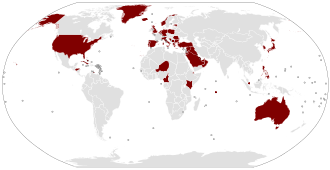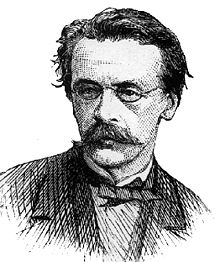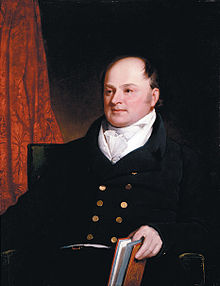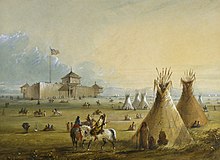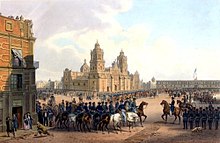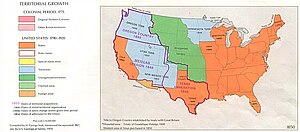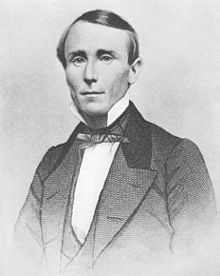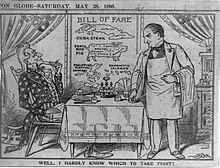From Wikipedia, the free encyclopedia
American Progress, (1872) by John Gast, is an allegorical representation of the modernization of the new west. Columbia,
a personification of the United States, is shown leading civilization
westward with the American settlers. She is shown bringing light from
the East into the West, stringing telegraph wire, holding a school
textbook that will instill knowledge, and highlights different stages of economic activity and evolving forms of transportation.
In the 19th century,
manifest destiny was a widely held belief in the
United States that its settlers were destined to expand across
North America. There are three basic themes to manifest destiny:
- The special virtues of the American people and their institutions
- The mission of the United States to redeem and remake the west in the image of agrarian America
- An irresistible destiny to accomplish this essential duty
Historian
Frederick Merk
says this concept was born out of "a sense of mission to redeem the Old
World by high example ... generated by the potentialities of a new
earth for building a new heaven".
Historians have emphasized that "manifest destiny" was a contested concept—
Democrats endorsed the idea but many prominent Americans (such as
Abraham Lincoln,
Ulysses S. Grant, and most
Whigs) rejected it. Historian
Daniel Walker Howe
writes, "American imperialism did not represent an American consensus;
it provoked bitter dissent within the national polity ...
Whigs saw America's moral mission as one of democratic example rather than one of conquest."
Newspaper editor
John O'Sullivan is generally credited with coining the term
manifest destiny in 1845 to describe the essence of this mindset, which was a rhetorical tone;
however, the unsigned editorial titled "Annexation" in which it first
appeared was arguably written by journalist and annexation advocate
Jane Cazneau. The term was used by
Democrats in the 1840s to justify the
war with Mexico and it was also used to divide half of
Oregon with the
United Kingdom.
But manifest destiny always limped along because of its internal
limitations and the issue of slavery, says Merk. It never became a
national priority. By 1843, former U.S. President
John Quincy Adams, originally a major supporter of the concept underlying manifest destiny, had changed his mind and repudiated
expansionism because it meant the expansion of slavery in Texas.
Merk concluded:
From the outset Manifest Destiny—vast in program, in its sense of continentalism—was
slight in support. It lacked national, sectional, or party following
commensurate with its magnitude. The reason was it did not reflect the
national spirit. The thesis that it embodied nationalism, found in much
historical writing, is backed by little real supporting evidence.
Context
There
was never a set of principles defining manifest destiny, therefore it
was always a general idea rather than a specific policy made with a
motto. Ill-defined but keenly felt, manifest destiny was an expression
of conviction in the morality and value of expansionism that
complemented other popular ideas of the era, including
American exceptionalism and
Romantic nationalism.
Andrew Jackson,
who spoke of "extending the area of freedom", typified the conflation
of America's potential greatness, the nation's budding sense of Romantic
self-identity, and its expansion.
Yet Jackson would not be the only president to elaborate on the
principles underlying manifest destiny. Owing in part to the lack of a
definitive narrative outlining its rationale, proponents offered
divergent or seemingly conflicting viewpoints. While many writers
focused primarily upon American expansionism, be it into Mexico or
across the Pacific, others saw the term as a call to example. Without an
agreed upon interpretation, much less an elaborated political
philosophy, these conflicting views of America's destiny were never
resolved. This variety of possible meanings was summed up by Ernest Lee
Tuveson: "A vast complex of ideas, policies, and actions is comprehended
under the phrase "Manifest Destiny". They are not, as we should expect,
all compatible, nor do they come from any one source."
Origin of the term
John L. O'Sullivan,
sketched in 1874, was an influential columnist as a young man, but he
is now generally remembered only for his use of the phrase "manifest
destiny" to advocate the annexation of Texas and Oregon.
Journalist
John L. O'Sullivan was an influential advocate for
Jacksonian democracy and a complex character, described by
Julian Hawthorne as "always full of grand and world-embracing schemes".
O'Sullivan wrote an article in 1839 that, while not using the term
"manifest destiny", did predict a "divine destiny" for the United States
based upon values such as equality, rights of conscience, and personal
enfranchisement "to establish on earth the moral dignity and salvation
of man".
This destiny was not explicitly territorial, but O'Sullivan predicted
that the United States would be one of a "Union of many Republics"
sharing those values.
Six years later, in 1845, O'Sullivan wrote another essay titled
Annexation in the
Democratic Review, in which he first used the phrase
manifest destiny. In this article he urged the U.S. to
annex the
Republic of Texas, not only because Texas desired this, but because it was "our manifest destiny to overspread the continent allotted by
Providence for the free development of our yearly multiplying millions". Overcoming Whig opposition, Democrats
annexed Texas in 1845. O'Sullivan's first usage of the phrase "manifest destiny" attracted little attention.
O'Sullivan's second use of the phrase became extremely influential. On December 27, 1845, in his newspaper the
New York Morning News, O'Sullivan addressed the
ongoing boundary dispute with Britain. O'Sullivan argued that the United States had the right to claim "the whole of Oregon":
And that claim is by the right of our manifest destiny to
overspread and to possess the whole of the continent which Providence
has given us for the development of the great experiment of liberty and
federated self-government entrusted to us.
That is, O'Sullivan believed that Providence had given the United States a mission to spread
republican democracy
("the great experiment of liberty"). Because Britain would not spread
democracy, thought O'Sullivan, British claims to the territory should be
overruled. O'Sullivan believed that manifest destiny was a moral ideal
(a "higher law") that superseded other considerations.
O'Sullivan's original conception of manifest destiny was not a
call for territorial expansion by force. He believed that the expansion
of the United States would happen without the direction of the
U.S. government or the involvement of the military. After Americans
immigrated to new regions, they would set up new democratic governments,
and then seek admission to the United States, as Texas had done. In
1845, O'Sullivan predicted that California would follow this pattern
next, and that Canada would eventually request annexation as well. He
disapproved of the
Mexican–American War in 1846, although he came to believe that the outcome would be beneficial to both countries.
Ironically, O'Sullivan's term became popular only after it was criticized by
Whig opponents of the
Polk administration.
Whigs denounced manifest destiny, arguing, "that the designers and
supporters of schemes of conquest, to be carried on by this government,
are engaged in treason to our Constitution and Declaration of Rights,
giving aid and comfort to the enemies of republicanism, in that they are
advocating and preaching the doctrine of the right of conquest". On January 3, 1846, Representative
Robert Winthrop
ridiculed the concept in Congress, saying "I suppose the right of a
manifest destiny to spread will not be admitted to exist in any nation
except the universal Yankee nation". Winthrop was the first in a long
line of critics who suggested that advocates of manifest destiny were
citing "Divine Providence" for justification of actions that were
motivated by chauvinism and self-interest. Despite this criticism,
expansionists embraced the phrase, which caught on so quickly that its
origin was soon forgotten.
Themes and influences
Historian William E. Weeks has noted that three key themes were usually touched upon by advocates of manifest destiny:
- the virtue of the American people and their institutions;
- the mission to spread these institutions, thereby redeeming and remaking the world in the image of the United States;
- the destiny under God to do this work.
We have it in our power to begin the world over again. A
situation, similar to the present, hath not happened since the days of
Noah until now. The birthday of a new world is at hand ...
Many Americans agreed with Paine, and came to believe that the United
States' virtue was a result of its special experiment in freedom and
democracy. Thomas Jefferson, in a letter to
James Monroe,
wrote, "it is impossible not to look forward to distant times when our
rapid multiplication will expand itself beyond those limits, and cover
the whole northern, if not the southern continent."
To Americans in the decades that followed their proclaimed freedom for
mankind, embodied in the Declaration of Independence, could only be
described as the inauguration of "a new time scale" because the world
would look back and define history as events that took place before, and
after, the Declaration of Independence. It followed that Americans owed to the world an obligation to expand and preserve these beliefs.
The second theme's origination is less precise. A popular
expression of America's mission was elaborated by President Abraham
Lincoln's description in his December 1, 1862, message to Congress. He
described the United States as "the last, best hope of Earth". The
"mission" of the United States was further elaborated during Lincoln's
Gettysburg Address, in which he interpreted the
Civil War
as a struggle to determine if any nation with democratic ideals could
survive; this has been called by historian Robert Johannsen "the most
enduring statement of America's Manifest Destiny and mission".
The third theme can be viewed as a natural outgrowth of the
belief that God had a direct influence in the foundation and further
actions of the United States.
Clinton Rossiter,
a scholar, described this view as summing "that God, at the proper
stage in the march of history, called forth certain hardy souls from the
old and privilege-ridden nations ... and that in bestowing his grace He
also bestowed a peculiar responsibility". Americans presupposed that
they were not only divinely elected to maintain the North American
continent, but also to "spread abroad the fundamental principles stated
in the Bill of Rights".
In many cases this meant neighboring colonial holdings and countries
were seen as obstacles rather than the destiny God had provided the
United States.
Most Democrats were wholehearted
supporters of expansion, whereas many Whigs (especially in the North)
were opposed. Whigs welcomed most of the changes wrought by
industrialization but advocated strong government policies that would
guide growth and development within the country's existing boundaries;
they feared (correctly) that expansion raised a contentious issue, the
extension of slavery to the territories. On the other hand, many
Democrats feared industrialization the Whigs welcomed... For many
Democrats, the answer to the nation's social ills was to continue to
follow Thomas Jefferson's vision of establishing agriculture in the new
territories in order to counterbalance industrialization.
Another possible influence is racial predominance, namely the idea
that the American Anglo-Saxon race was "separate, innately superior" and
"destined to bring good government, commercial prosperity and
Christianity to the American continents and the world". This view also
held that "inferior races were doomed to subordinate status or
extinction." This was used to justify "the enslavement of the blacks and
the expulsion and possible extermination of the Indians".
Alternative interpretations
With the
Louisiana Purchase in 1803, which doubled the size of the United States,
Thomas Jefferson set the stage for the continental expansion of the United States. Many began to see this as the beginning of a new
providential mission: If the United States was successful as a "
shining city upon a hill", people in other countries would seek to establish their own democratic republics.
However, not all Americans or their political leaders believed
that the United States was a divinely favored nation, or thought that it
ought to expand. For example, many
Whigs
opposed territorial expansion based on the Democratic claim that the
United States was destined to serve as a virtuous example to the rest of
the world, and also had a divine obligation to spread its superordinate
political system and a way of life throughout North American continent.
Many in the Whig party "were fearful of spreading out too widely", and
they "adhered to the concentration of national authority in a limited
area". In July 1848,
Alexander Stephens denounced
President Polk's expansionist interpretation of America's future as "mendacious".
- I was bitterly opposed to the measure [to annex Texas], and to
this day regard the war [with Mexico] which resulted as one of the most
unjust ever waged by a stronger against a weaker nation. It was an
instance of a republic following the bad example of European monarchies,
in not considering justice in their desire to acquire additional
territory.
In the mid‑19th century, expansionism, especially southward toward
Cuba, also faced opposition from those Americans who were trying to
abolish slavery. As more territory was added to the United States in the
following decades, "extending the area of freedom" in the minds of
southerners also meant extending the institution of slavery. That is why
slavery became one of the central issues in the continental expansion
of the United States before the Civil War.
Before and during the Civil War both sides claimed that America's
destiny were rightfully their own. Lincoln opposed anti-immigrant
nativism, and the imperialism of manifest destiny as both unjust and unreasonable.
He objected to the Mexican War and believed each of these disordered
forms of patriotism threatened the inseparable moral and fraternal bonds
of liberty and Union that he sought to perpetuate through a patriotic
love of country guided by wisdom and critical self-awareness. Lincoln's "
Eulogy to Henry Clay", June 6, 1852, provides the most cogent expression of his reflective patriotism.
Era of continental expansion
John Quincy Adams, painted above in 1816 by Charles Robert Leslie,
was an early proponent of continentalism. Late in life he came to
regret his role in helping U.S. slavery to expand, and became a leading
opponent of the annexation of Texas.
War of 1812
One of the goals of the War of 1812 was to threaten to annex British Canada in order to stop the Indian raids into the Midwest. The result of this overoptimism was a series of defeats in 1812. However, the American victories at the
Battle of Lake Erie and the
Battle of the Thames in 1813 ended the Indian raids and removed the main reason for threatening annexation. To end the
War of 1812 John Quincy Adams,
Henry Clay and
Albert Gallatin (former Treasury Secretary and a leading expert on Indians) and the other American diplomats negotiated the
Treaty of Ghent
in 1814 with Britain. They rejected the British plan to set up an
Indian state in U.S. territory south of the Great Lakes. They explained
the American policy toward acquisition of Indian lands:
The United States, while intending
never to acquire lands from the Indians otherwise than peaceably, and
with their free consent, are fully determined, in that manner,
progressively, and in proportion as their growing population may
require, to reclaim from the state of nature, and to bring into
cultivation every portion of the territory contained within their
acknowledged boundaries. In thus providing for the support of millions
of civilized beings, they will not violate any dictate of justice or of
humanity; for they will not only give to the few thousand savages
scattered over that territory an ample equivalent for any right they may
surrender, but will always leave them the possession of lands more than
they can cultivate, and more than adequate to their subsistence,
comfort, and enjoyment, by cultivation. If this be a spirit of
aggrandizement, the undersigned are prepared to admit, in that sense,
its existence; but they must deny that it affords the slightest proof of
an intention not to respect the boundaries between them and European
nations, or of a desire to encroach upon the territories of Great
Britain ... They will not suppose that that Government will avow, as the
basis of their policy towards the United States a system of arresting
their natural growth within their own territories, for the sake of
preserving a perpetual desert for savages.
A shocked
Henry Goulburn,
one of the British negotiators at Ghent, remarked, after coming to
understand the American position on taking the Indians' land:
Till I came here, I had no idea of
the fixed determination which there is in the heart of every American to
extirpate the Indians and appropriate their territory.
Continentalism
The whole continent of North America appears to be destined by Divine Providence to be peopled by one nation,
speaking one language, professing one general system of religious and
political principles, and accustomed to one general tenor of social
usages and customs. For the common happiness of them all, for their
peace and prosperity, I believe it is indispensable that they should be
associated in one federal Union.
The first Fort Laramie as it looked prior to 1840. Painting from memory by Alfred Jacob Miller
The Monroe Doctrine and "manifest destiny" formed a closely
related nexus of principles: historian Walter McDougall calls manifest
destiny a corollary of the Monroe Doctrine, because while the Monroe
Doctrine did not specify expansion, expansion was necessary in order to
enforce the Doctrine. Concerns in the United States that European powers
(especially Great Britain) were seeking to acquire colonies or greater
influence in North America led to calls for expansion in order to
prevent this. In his influential 1935 study of manifest destiny, Albert
Weinberg wrote: "the expansionism of the [1830s] arose as a defensive
effort to forestall the encroachment of Europe in North America".
All Oregon
Manifest destiny played its most important role in the
Oregon boundary dispute between the United States and Britain, when the phrase "manifest destiny" originated. The
Anglo-American Convention of 1818 had provided for the joint occupation of the
Oregon Country, and thousands of Americans migrated there in the 1840s over the
Oregon Trail. The British rejected a proposal by U.S. President
John Tyler (in office 1841–1845) to divide the region along the
49th parallel, and instead proposed a boundary line farther south along the
Columbia River, which would have made most of what later became the state of
Washington
part of British North America. Advocates of manifest destiny protested
and called for the annexation of the entire Oregon Country up to the
Alaska line (54°40ʹ N). Presidential candidate
James K. Polk used this popular outcry to his advantage, and the Democrats called for the annexation of "All Oregon" in the
1844 U.S. Presidential election.
As president, however, Polk sought compromise and renewed the earlier
offer to divide the territory in half along the 49th parallel, to the
dismay of the most ardent advocates of manifest destiny. When the
British refused the offer, American expansionists responded with slogans
such as "The Whole of Oregon or None!" and "Fifty-Four Forty or
Fight!", referring to the northern border of the region. (The latter
slogan is often mistakenly described as having been a part of the 1844
presidential campaign.) When Polk moved to terminate the joint
occupation agreement, the British finally agreed in early 1846 to divide
the region along the 49th parallel, leaving the lower Columbia basin as
part of the United States. The
Oregon Treaty
of 1846 formally settled the dispute; Polk's administration succeeded
in selling the treaty to Congress because the United States was about to
begin the
Mexican–American War, and the president and others argued it would be foolish
to also fight the British Empire.
Despite the earlier clamor for "All Oregon", the Oregon Treaty
was popular in the United States and was easily ratified by the Senate.
The most fervent advocates of manifest destiny had not prevailed along
the northern border because, according to
Reginald Stuart, "the compass of manifest destiny pointed west and southwest, not north, despite the use of the term 'continentalism
'".
| “
|
It was
an oversight on the part of the United States, the giving up the island
of Quadra and Vancouver, on the settlement of the boundary question.
Yet, "what is to be, will be", as some realist has it; and we look for
the restoration of that picturesque and rocky atom of our former
territory as inevitable.
|
”
|
Mexico and Texas
Manifest destiny played an important role in the expansion of Texas and American relationship with
Mexico. In 1836, the
Republic of Texas declared independence from Mexico and, after the
Texas Revolution,
sought to join the United States as a new state. This was an idealized
process of expansion that had been advocated from Jefferson to
O'Sullivan: newly democratic and independent states would request entry
into the United States, rather than the United States extending its
government over people who did not want it. The annexation of Texas was
attacked by anti-slavery spokesmen because it would add another slave
state to the Union. Presidents Andrew Jackson and Martin Van Buren
declined Texas's offer to join the United States in part because the
slavery issue threatened to divide the Democratic Party.
Before the election of 1844, Whig candidate
Henry Clay
and the presumed Democratic candidate, former President Van Buren, both
declared themselves opposed to the annexation of Texas, each hoping to
keep the troublesome topic from becoming a campaign issue. This
unexpectedly led to Van Buren being dropped by the Democrats in favor of
Polk, who favored annexation. Polk tied the Texas annexation question
with the Oregon dispute, thus providing a sort of regional compromise on
expansion. (Expansionists in the North were more inclined to promote
the occupation of Oregon, while Southern expansionists focused primarily
on the annexation of Texas.) Although elected by a very slim margin,
Polk proceeded as if his victory had been a mandate for expansion.
All Mexico
American occupation of Mexico City in 1847
After the election of Polk, but before he took office, Congress approved the
annexation of Texas. Polk moved to occupy a portion of Texas that had
declared independence from Mexico in 1836, but was still claimed by Mexico. This paved the way for the outbreak of the
Mexican–American War
on April 24, 1846. With American successes on the battlefield, by the
summer of 1847 there were calls for the annexation of "All Mexico",
particularly among Eastern Democrats, who argued that bringing Mexico
into the Union was the best way to ensure future peace in the region.
This was a controversial proposition for two reasons. First,
idealistic advocates of manifest destiny like John L. O'Sullivan had
always maintained that the laws of the United States should not be
imposed on people against their will. The annexation of "All Mexico"
would be a violation of this principle. And secondly, the annexation of
Mexico was controversial because it would mean extending
U.S. citizenship to millions of Mexicans. Senator
John C. Calhoun
of South Carolina, who had approved of the annexation of Texas, was
opposed to the annexation of Mexico, as well as the "mission" aspect of
manifest destiny, for racial reasons. He made these views clear in a speech to Congress on January 4, 1848:
We have never dreamt of incorporating into our Union any
but the Caucasian race—the free white race. To incorporate Mexico, would
be the very first instance of the kind, of incorporating an Indian
race; for more than half of the Mexicans are Indians, and the other is
composed chiefly of mixed tribes. I protest against such a union as
that! Ours, sir, is the Government of a white race.... We are anxious to
force free government on all; and I see that it has been urged ... that
it is the mission of this country to spread civil and religious liberty
over all the world, and especially over this continent. It is a great
mistake.
This debate brought to the forefront one of the contradictions of
manifest destiny: on the one hand, while identitarian ideas inherent in
manifest destiny suggested that Mexicans, as non-whites, would present a
threat to white racial integrity and thus were not qualified to become
Americans, the "mission" component of manifest destiny suggested that
Mexicans would be improved (or "regenerated", as it was then described)
by bringing them into American democracy. Identitarianism was used to
promote manifest destiny, but, as in the case of Calhoun and the
resistance to the "All Mexico" movement, identitarianism was also used
to oppose manifest destiny. Conversely, proponents of annexation of "All Mexico" regarded it as an anti-slavery measure.
The controversy was eventually ended by the
Mexican Cession, which added the territories of
Alta California and
Nuevo México
to the United States, both more sparsely populated than the rest of
Mexico. Like the All Oregon movement, the All Mexico movement quickly
abated.
Historian
Frederick Merk, in
Manifest Destiny and Mission in American History: A Reinterpretation
(1963), argued that the failure of the "All Oregon" and "All Mexico"
movements indicates that manifest destiny had not been as popular as
historians have traditionally portrayed it to have been. Merk wrote
that, while belief in the beneficent mission of democracy was central to
American history, aggressive "continentalism" were aberrations
supported by only a minority of Americans, all of them Democrats. Some
Democrats were also opposed; the Democrats of Louisiana opposed
annexation of Mexico, while those in Mississippi supported it.
Filibusterism
After
the Mexican–American War ended in 1848, disagreements over the
expansion of slavery made further annexation by conquest too divisive to
be official government policy. Some, such as
John Quitman,
governor of Mississippi, offered what public support they could offer.
In one memorable case, Quitman simply explained that the state of
Mississippi had "lost" its state arsenal, which began showing up in the
hands of filibusters. Yet these isolated cases only solidified
opposition in the North as many Northerners were increasingly opposed to
what they believed to be efforts by Southern slave owners—and their
friends in the North—to expand slavery through
filibustering.
Sarah P. Remond on January 24, 1859, delivered an impassioned speech at
Warrington, England,
that the connection between filibustering and slave power was clear
proof of "the mass of corruption that underlay the whole system of
American government". The
Wilmot Proviso and the continued "
Slave Power" narratives thereafter, indicated the degree to which manifest destiny had become part of the sectional controversy.
Without official government support the most radical advocates of manifest destiny increasingly turned to
military filibustering. Originally filibuster had come from the Dutch
vrijbuiter
and referred to buccaneers in the West Indies that preyed on Spanish
commerce. While there had been some filibustering expeditions into
Canada in the late 1830s, it was only by mid-century did filibuster
become a definitive term. By then, declared the
New-York Daily Times
"the fever of Fillibusterism is on our country. Her pulse beats like a
hammer at the wrist, and there's a very high color on her face."
Millard Fillmore's second annual message to Congress, submitted in
December 1851, gave double the amount of space to filibustering
activities than the brewing sectional conflict. The eagerness of the
filibusters, and the public to support them, had an international hue.
Clay's son, a diplomat in Portugal, reported that the invasion created a
sensation in Lisbon.
Although they were illegal, filibustering operations in the late
1840s and early 1850s were romanticized in the United States. The
Democratic Party's national platform included a plank that specifically
endorsed William Walker's filibustering in
Nicaragua.
Wealthy American expansionists financed dozens of expeditions, usually
based out of New Orleans, New York, and San Francisco. The primary
target of manifest destiny's filibusters was Latin America but there
were isolated incidents elsewhere. Mexico was a favorite target of
organizations devoted to filibustering, like the Knights of the Golden
Circle.
William Walker got his start as a filibuster in an ill-advised attempt
to separate the Mexican states Sonora and Baja California.
Narciso López, a near second in fame and success, spent his efforts trying to secure Cuba from the
Spanish Empire.
The United States had long been interested in acquiring Cuba from the declining
Spanish Empire.
As with Texas, Oregon, and California, American policy makers were
concerned that Cuba would fall into British hands, which, according to
the thinking of the Monroe Doctrine, would constitute a threat to the
interests of the United States. Prompted by John L. O'Sullivan, in 1848
President Polk offered to buy Cuba from Spain for $100 million. Polk
feared that filibustering would hurt his effort to buy the island, and
so he informed the Spanish of an attempt by the Cuban filibuster Narciso
López to seize Cuba by force and annex it to the United States, foiling
the plot. Nevertheless, Spain declined to sell the island, which ended
Polk's efforts to acquire Cuba. O'Sullivan, on the other hand eventually
landed in legal trouble.
Filibustering continued to be a major concern for presidents after Polk. Whigs presidents
Zachary Taylor and
Millard Fillmore tried to suppress the expeditions. When the Democrats recaptured the White House in 1852 with the election of
Franklin Pierce, a filibustering effort by
John A. Quitman
to acquire Cuba received the tentative support of the president. Pierce
backed off, however, and instead renewed the offer to buy the island,
this time for $130 million. When the public learned of the
Ostend Manifesto
in 1854, which argued that the United States could seize Cuba by force
if Spain refused to sell, this effectively killed the effort to acquire
the island. The public now linked expansion with slavery; if manifest
destiny had once enjoyed widespread popular approval, this was no longer
true.
Filibusters like
William Walker continued to garner headlines in the late 1850s, but to little effect. Expansionism was among the various
issues that played a role
in the coming of the war. With the divisive question of the expansion
of slavery, Northerners and Southerners, in effect, were coming to
define manifest destiny in different ways, undermining nationalism as a
unifying force. According to Frederick Merk, "The doctrine of Manifest
Destiny, which in the 1840s had seemed Heaven-sent, proved to have been a
bomb wrapped up in idealism."
Homestead Act
The Homestead Act of 1862 encouraged 600,000 families to settle the West by giving them land (usually 160
acres) almost free. They had to live on and improve the land for five years. Before the Civil War, Southern leaders opposed the
Homestead Acts because they feared it would lead to more free states and free territories.
After the mass resignation of Southern senators and representatives at
the beginning of the war, Congress was subsequently able to pass the
Homestead Act.
Native Americans
Across The Continent, an 1868 lithograph illustrating the westward expansion of white settlers
Manifest destiny had serious consequences for
Native Americans,
since continental expansion implicitly meant the occupation and
annexation of Native American land, sometimes to expand slavery. This
ultimately led to confrontations and wars with several groups of native
peoples via
Indian removal. The United States continued the European practice of recognizing only limited land rights of
indigenous peoples. In a policy formulated largely by
Henry Knox,
Secretary of War
in the Washington Administration, the U.S. government sought to expand
into the west through the purchase of Native American land in treaties.
Only the Federal Government could purchase Indian lands and this was
done through treaties with tribal leaders. Whether a tribe actually had a
decision-making structure capable of making a treaty was a
controversial issue. The national policy was for the Indians to join
American society and become "civilized", which meant no more wars with
neighboring tribes or raids on white settlers or travelers, and a shift
from hunting to farming and ranching. Advocates of civilization programs
believed that the process of settling native tribes would greatly
reduce the amount of land needed by the Native Americans, making more
land available for homesteading by white Americans.
Thomas Jefferson believed that while American Indians were the intellectual equals of whites, they had to live like the whites or inevitably be pushed aside by them. Jefferson's belief, rooted in
Enlightenment
thinking, that whites and Native Americans would merge to create a
single nation did not last his lifetime, and he began to believe that
the natives should emigrate across the
Mississippi River and maintain a separate society, an idea made possible by the
Louisiana Purchase of 1803.
In the age of manifest destiny, this idea, which came to be known as "
Indian removal",
gained ground. Humanitarian advocates of removal believed that American
Indians would be better off moving away from whites. As historian
Reginald Horsman argued in his influential study
Race and Manifest Destiny,
racial rhetoric increased during the era of manifest destiny. Americans
increasingly believed that Native American ways of life would "fade
away" as the United States expanded. As an example, this idea was
reflected in the work of one of America's first great historians,
Francis Parkman, whose landmark book
The Conspiracy of Pontiac
was published in 1851. Parkman wrote that after the British conquest of
Canada in 1760, Indians were "destined to melt and vanish before the
advancing waves of Anglo-American power, which now rolled westward
unchecked and unopposed". Parkman emphasized that the collapse of Indian
power in the late 18th century had been swift and was a past event.
Beyond North America
As the Civil War faded into history, the term
manifest destiny experienced a brief revival. Protestant missionary
Josiah Strong, in his best seller of 1885
Our Country,
argued that the future was devolved upon America since it had perfected
the ideals of civil liberty, "a pure spiritual Christianity", and
concluded, "My plea is not, Save America for America's sake, but, Save
America for the world's sake."
In the
1892 U.S. presidential election, the
Republican Party platform proclaimed: "We reaffirm our approval of the
Monroe doctrine and believe in the achievement of the manifest destiny of the Republic in its broadest sense."
What was meant by "manifest destiny" in this context was not clearly
defined, particularly since the Republicans lost the election.
In the
1896 election,
however, the Republicans recaptured the White House and held on to it
for the next 16 years. During that time, manifest destiny was cited to
promote
overseas expansion.
Whether or not this version of manifest destiny was consistent with the
continental expansionism of the 1840s was debated at the time, and long
afterwards.
For example, when President
William McKinley advocated annexation of the
Republic of Hawaii
in 1898, he said that "We need Hawaii just as much and a good deal more
than we did California. It is manifest destiny." On the other hand,
former President
Grover Cleveland,
a Democrat who had blocked the annexation of Hawaii during his
administration, wrote that McKinley's annexation of the territory was a
"perversion of our national destiny". Historians continued that debate;
some have interpreted American acquisition of other Pacific island
groups in the 1890s as an extension of manifest destiny across the
Pacific Ocean. Others have regarded it as the antithesis of manifest destiny and merely
imperialism.
Spanish–American War and the Philippines
A cartoon of Uncle Sam
seated in restaurant looking at the bill of fare containing "Cuba
steak", "Porto Rico pig", the "Philippine Islands" and the "Sandwich
Islands" (Hawaii).
In 1898, the United States intervened in the Cuban insurrection and launched the
Spanish–American War to force Spain out. According to the terms of the
Treaty of Paris, Spain relinquished sovereignty over Cuba and ceded the
Philippine Islands,
Puerto Rico, and
Guam
to the United States. The terms of cession for the Philippines involved
a payment of the sum of $20 million by the United States to Spain. The
treaty was highly contentious and denounced by
William Jennings Bryan, who tried to make it a central issue
in the 1900 election. He was defeated in landslide by McKinley.
The
Teller Amendment,
passed unanimously by the U.S. Senate before the war, which proclaimed
Cuba "free and independent", forestalled annexation of the island. The
Platt Amendment (1902), however, established Cuba as a virtual
protectorate of the United States.
The acquisition of
Guam,
Puerto Rico, and the
Philippines after the war with
Spain
marked a new chapter in U.S. history. Traditionally, territories were
acquired by the United States for the purpose of becoming new states on
equal footing with already existing states. These islands, however, were
acquired as
colonies rather than prospective states. The process was validated by the
Insular Cases.
The Supreme Court ruled that full constitutional rights did not
automatically extend to all areas under American control. Nevertheless,
in 1917, Puerto Ricans were all made full American citizens via the
Jones Act.
This also provided for a popularly elected legislature and a bill of
rights, and authorized the election of a Resident Commissioner who has a
voice (but no vote) in Congress.
According to Frederick Merk, these colonial acquisitions marked a
break from the original intention of manifest destiny. Previously,
"Manifest Destiny had contained a principle so fundamental that a
Calhoun and an O'Sullivan could agree on it—that a people not capable of
rising to statehood should never be annexed. That was the principle
thrown overboard by the imperialism of 1899."
Albert J. Beveridge
maintained the contrary at his September 25, 1900, speech in the
Auditorium, at Chicago. He declared that the current desire for Cuba and
the other acquired territories was identical to the views expressed by
Washington, Jefferson and Marshall. Moreover, "the sovereignty of the
Stars and Stripes can be nothing but a blessing to any people and to any
land."
The Philippines was eventually given its independence in 1946; Guam and
Puerto Rico have special status to this day, but all their people have
United States citizenship.
The English poet
Rudyard Kipling wrote "
The White Man's Burden"
to Americans, calling on them to take up their share of the burden.
Subtitled "The United States and the Philippine Islands", it was a
widely noted expression of imperialist sentiments, which were common at the time. The nascent
revolutionary government desirous of independence, however, resisted the United States in the
Philippine–American War in 1899; it won no support from any government anywhere and collapsed when its leader was captured.
William Jennings Bryan denounced the war and any form of overseas expansion, writing,
"'Destiny' is not as manifest as it was a few weeks ago."
Legacy and consequences
After the turn of the nineteenth century to the twentieth, the phrase
manifest destiny declined in usage, as territorial expansion ceased to be promoted as being a part of America's "destiny". Under President
Theodore Roosevelt the role of the United States in the New World was defined, in the 1904
Roosevelt Corollary to the
Monroe Doctrine,
as being an "international police power" to secure American interests
in the Western Hemisphere. Roosevelt's corollary contained an explicit
rejection of territorial expansion. In the past, manifest destiny had
been seen as necessary to enforce the Monroe Doctrine in the Western
Hemisphere, but now expansionism had been replaced by
interventionism as a means of upholding the doctrine.
President
Woodrow Wilson
continued the policy of interventionism in the Americas, and attempted
to redefine both manifest destiny and America's "mission" on a broader,
worldwide scale. Wilson led the United States into
World War I
with the argument that "The world must be made safe for democracy." In
his 1920 message to Congress after the war, Wilson stated:
... I think we all realize that the day has come when
Democracy is being put upon its final test. The Old World is just now
suffering from a wanton rejection of the principle of democracy and a
substitution of the principle of autocracy as asserted in the name, but
without the authority and sanction, of the multitude. This is the time
of all others when Democracy should prove its purity and its spiritual
power to prevail. It is surely the manifest destiny of the United States
to lead in the attempt to make this spirit prevail.
This was the only time a president had used the phrase "manifest
destiny" in his annual address. Wilson's version of manifest destiny was
a rejection of expansionism and an endorsement (in principle) of
self-determination,
emphasizing that the United States had a mission to be a world leader
for the cause of democracy. This U.S. vision of itself as the leader of
the "
Free World" would grow stronger in the 20th century after
World War II, although rarely would it be described as "manifest destiny", as Wilson had done.
"Manifest destiny" is sometimes used by critics of U.S. foreign
policy to characterize interventions in the Middle East and elsewhere.
In this usage, "manifest destiny" is interpreted as the underlying cause
of what is denounced by some as "
American imperialism".
A more positive-sounding phrase devised by scholars at the end of the
twentieth century is "nation building", and State Department official
Karin Von Hippel notes that the U.S. has "been involved in
nation-building and promoting democracy since the middle of the
nineteenth century and 'Manifest Destiny
'".
